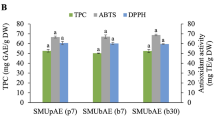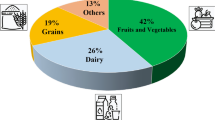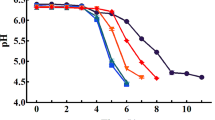Abstract
Pidan, a pickled duck egg, is a traditional Chinese cuisine and generally produced by soaking in metal ion containing strong alkaline solution such as NaOH solution. However, nowadays consumers possess negative perception for using strong alkali in food processing. Therefore, the objective of the current study was to determine the potential of incinerated eggshell powder and alkaline electrolyzed oxidized (EO) water for pidan production rather than harmful NaOH use. This study aims to obtain the optimal physicochemical and sensory qualities of pidan. Various dosing (1–5%) of the incinerated eggshell powder solution or alkaline EO water was used as a basic pickling solution. Duck eggs were pickled at 25–27 °C for 15–30 days with 3 days of an observation interval. Actual commercial process commonly undergoes for 14 days of ripening, after 25 days of picking process with incinerated eggshell powder or EO water. Results showed that physicochemical and sensory attributes of pidan obtained by incinerated eggshell powder solution and alkaline EO water were not significantly different (P < 0.05) from the commercial product. This study reports a cost-effective and green alternative method for pidan processing by replacing costly NaOH without compromising their physico-chemical and sensory attributes.

Similar content being viewed by others
Data availability
Not applicable.
Code availability
Not applicable.
References
Abín R, Laca A, Laca A, Díaz M (2018) Environmental assesment of intensive egg production: a Spanish case study. J Clean Prod 179:160–168. https://doi.org/10.1016/j.jclepro.2018.01.067
Ai M, Zhou Q, Guo S, Fan H, Cao Y, Ling Z, Zhou L, Jiang A (2020) Characteristics of intermolecular forces, physicochemical, textural and microstructural properties of preserved egg white with Ca(OH)2 addition. Food Chem 314:126206
Bonnard M, Boury B, Parrot I (2020) Key insights, tools, and future prospects on oyster shell end-of-life: a critical analysis of sustainable solutions. Environ Sci Technol 54(1):26–38. https://doi.org/10.1021/acs.est.9b03736
Cai J, Sweeney AM (2018) The proof is in the pidan: generalizing proteins as patchy particles. ACS Cent Sci 4(7):840–853. https://doi.org/10.1021/acscentsci.8b00187
Cartus A (2017) Chapter 12 - d-amino acids and cross-linked amino acids in food. In: Schrenk D, Cartus A (eds) Chemical contaminants and residues in food, 2nd edn. Woodhead Publishing, pp 251–278
Chang HM, Tsai CF, Li CF (1999) Quantification of racemization of amino acids in alkaline-treated duck eggs by micellar capillary electrophoresis. J Agric Food Chem 47(2):479–484
Chen Z, Li J, Tu Y, Zhao Y, Luo X, Wang J, Wang M (2015) Changes in gel characteristics of egg white under strong alkali treatment. Food Hydrocolloids 45:1–8. https://doi.org/10.1016/j.foodhyd.2014.10.026
Cho MG, Bae SM, Jeong JY (2017) Egg shell and oyster shell powder as alternatives for synthetic phosphate: effects on the quality of cooked ground pork products. Korean J Food Sci Anim Resour 37(4):571–578. https://doi.org/10.5851/kosfa.2017.37.4.571
Choi YM, Whang JH, Kim JM, Suh HJ (2006) The effect of oyster shell powder on the extension of the shelf-life of kimchi. Food Control 17(9):695–699. https://doi.org/10.1016/j.foodcont.2005.04.005
Drake MA, Delahunty CM (2017) Chapter 20 - sensory character of cheese and its evaluation. In: McSweeney PLH, Fox PF, Cotter PD, Everett DW (eds) Cheese, 4th edn. Academic Press, San Diego, pp 517–545
Eiser E, Miles CS, Geerts N, Verschuren P, MacPhee CE (2009) Molecular cooking: physical transformations in Chinese century eggs. Soft Matter 5(14):2725–2730
Ganasen P, Benjakul S (2010) Physical properties and microstructure of pidan yolk as affected by different divalent and monovalent cations. LWT Food Sci Technol 43(1):77–85. https://doi.org/10.1016/j.lwt.2009.06.007
Ganasen P, Benjakul S (2011) Effects of green tea and Chinese tea on the composition and physical properties of pidan white. J Food Process Preserv 35(6):907–916. https://doi.org/10.1111/j.1745-4549.2011.00544.x
Ho W-F, Hsu H-C, Hsu S-K, Hung C-W, Wu S-C (2013) Calcium phosphate bioceramics synthesized from eggshell powders through a solid state reaction. Ceram Int 39(6):6467–6473. https://doi.org/10.1016/j.ceramint.2013.01.076
Iram A, Wang X, Demirci A (2021) Electrolyzed oxidizing water and its applications as sanitation and cleaning agent. Food Eng Rev 13(2):411–427. https://doi.org/10.1007/s12393-021-09278-9
Khalid NI, Sulaiman NS, Ab Aziz N, Taip FS, Sobri S, Mahmud Ab Rashid N-K (2020) Optimization of electrolysis parameters for green sanitation chemicals production using response surface methodology. Processes 8(7):792
Kim MJ, Hung Y-C (2014) Effect of alkaline electrolyzed water as an inhibitor of enzymatic browning in red delicious apples. J Food Biochem 38(6):542–550. https://doi.org/10.1111/jfbc.12086
Kuang H, Yang F, Zhang Y, Wang T, Chen G (2018) The impact of egg nutrient composition and its consumption on cholesterol homeostasis. Cholesterol 2018:6303810. https://doi.org/10.1155/2018/6303810
Liang Y, He L, Zhang M, Liu X, Jin G, Jin Y, Ma M (2020) Preserved egg digests promote the apoptosis of HT29 and HepG2 cells. Food Biosci 36:100661. https://doi.org/10.1016/j.fbio.2020.100661
Lin H-M, Hung Y-C, Deng S-G (2020) Effect of partial replacement of polyphosphate with alkaline electrolyzed water on the quality of catfish fillets. Food Control 112:107117. https://doi.org/10.1016/j.foodcont.2020.107117
Liu Y, Wang J, Zhu X, Liu Y, Cheng M, Xing W, Song P (2021) Effects of electrolyzed water treatment on pesticide removal and texture quality in fresh-cut cabbage, broccoli, and color pepper. Food Chem 353:129408. https://doi.org/10.1016/j.foodchem.2021.129408
Luo W, Xue H, Xiong C, Li J, Tu Y, Zhao Y (2020) Effects of temperature on quality of preserved eggs during storage. Poult Sci 99(6):3144–3157. https://doi.org/10.1016/j.psj.2020.01.020
Mohadi R, Anggraini K, Riyanti F, Lesbani A (2016) Preparation calcium oxide from chicken eggshells. Sri J Env 1:32–35. https://doi.org/10.22135/sje.2016.1.2.32-35
Rahman S, Khan I, Oh D-H (2016) Electrolyzed water as a novel sanitizer in the food industry: current trends and future perspectives. Compr Rev Food Sci Food Saf 15(3):471–490. https://doi.org/10.1111/1541-4337.12200
Ro EY, Ko YM, Yoon KS (2015) Survival of pathogenic enterohemorrhagic Escherichia coli (EHEC) and control with calcium oxide in frozen meat products. Food Microbiol 49:203–210. https://doi.org/10.1016/j.fm.2015.02.010
Seo JH, Park SM, Yang BJ, Jang JG (2019) Calcined oyster shell powder as an expansive additive in cement mortar. Materials 12(8):1322
Tangboriboon N, Kunanuruksapong R, Sirivat A (2012) Preparation and properties of calcium oxide from eggshells via calcination. Mater Sci Pol 30(4):313–322. https://doi.org/10.2478/s13536-012-0055-7
Wang Y, Xiong C, Luo W, Li J, Tu Y, Zhao Y (2021) Effects of packaging methods on the quality of heavy metals–free preserved duck eggs during storage. Poult Sci 100(5):101051. https://doi.org/10.1016/j.psj.2021.101051
Zhang X, Jiang A, Chen M, Ockerman HW, Chen J (2015) Effect of different alkali treatments on the chemical composition, physical properties, and microstructure of pidan white. J Food Sci Technol 52(4):2264–2271. https://doi.org/10.1007/s13197-013-1201-x
Zhao Y, Tu Y, Xu M, Li J, Du H (2014) Physicochemical and nutritional characteristics of preserved duck egg white. Poult Sci 93(12):3130–3137. https://doi.org/10.3382/ps.2013-03823
Zhao Y, Cao D, Shao Y, Xiong C, Li J, Tu Y (2020) Changes in physico-chemical properties, microstructures, molecular forces and gastric digestive properties of preserved egg white during pickling with the regulation of different metal compounds. Food Hydrocoll 98:105281. https://doi.org/10.1016/j.foodhyd.2019.105281
Zhao L, Li S, Yang H (2021) Recent advances on research of electrolyzed water and its applications. Curr Opin Food Sci. https://doi.org/10.1016/j.cofs.2021.03.004
Acknowledgements
The authors would like to thank all the individuals who volunteered for this study.
Funding
This research was funded by the Ministry of Science and Technology, Republic of China (Grant no. 110-2320-B-992-001-MY3 and 110-2622-E-992-012-).
Author information
Authors and Affiliations
Contributions
C-ML and C-YH; Data curation, C-ML and C-WH; Funding acquisition, Y-L H and C-YH; Investigation, Y-L H, M-K S and C-YH; Methodology, Y-L H and C-YH; Project administration, C-W H; Resources, M-K S and P-H H; Software, C-ML and C-YH; Supervision, M-K S C-DD, and C-WH; Validation, C-PH, Y-L H, AKP, and P-H H; Visualization, C-YH and P-H H; Writing—Original draft, C-ML, C-YH, AKP, C-DD, and P-H H; Writing—Review & editing. All authors have read and agreed to the published version of the manuscript.
Corresponding author
Ethics declarations
Conflict of interest
The authors declare no conflict of interest.
Ethics approval
Not applicable.
Consent to participate
Not applicable.
Consent for publication
All authors have read and agreed to the published version of the manuscript.
Additional information
Publisher's Note
Springer Nature remains neutral with regard to jurisdictional claims in published maps and institutional affiliations.
Rights and permissions
About this article
Cite this article
Hou, CY., Lin, CM., Patel, A.K. et al. Development of novel green methods for preparation of lead-free preserved pidan (duck egg). J Food Sci Technol 60, 966–974 (2023). https://doi.org/10.1007/s13197-022-05417-0
Revised:
Accepted:
Published:
Issue Date:
DOI: https://doi.org/10.1007/s13197-022-05417-0




